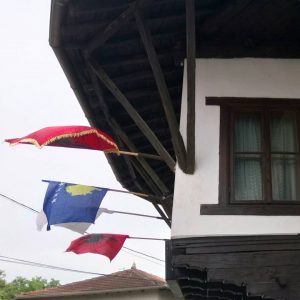Jan 25 2018
SECURITY SECTOR REFORM IN CENTRAL AFRICAN REPUBLIC AFTER 2008
INTRODUCTION
Security Sector Reform is categorized in second generation of peacekeeping operations which aim to prevent the future conflicts in intervened conflicts in addition to ŌĆśfreezingŌĆÖ the conflict (Kenkel, 2013). This concept covers ŌĆśall those organizations that have the authority to use, or order the use of, force or threat of force, to protect the state and its citizens, as well as those civil structures that are responsible for their management and oversightŌĆÖ (Schnabel and Ehrhart, 2005). However, in post-conflict societies, SSR also aims to support peacebuilding. (Ingerstad, 2012) Because SSR can be related to all state institutions and also to all segments of society; the selected concept and the area of implementation of it, can reflect the debates in statebuilding and peacebuilding literatures and can also be a ŌĆśbridgeŌĆÖ in these discussions. Furthermore, Since the SSR has additional objective in peacebuilding and due to the central place of being ŌĆśtheŌĆÖ security provider in state building for a state, the importance of SSR in both processes increases.
The concept, additionally, is not only about police and military branches but also about judiciary, governance and transparency as SSR has been intermingled with rule of law, human security and development. Moreover, as an intervention-led concept in post-conflict countries; supported/ sponsored by foreign nation-states and supra-national organizations such as the United Nation(UN), the European Union(EU) and the Organization of Security and Co-operation in Europe(OSCE), the United Nations Development Program(UNDP); SSR brings various actors at different levels, thus, has a complex structure to be discovered.
As a former colony of France, Central African Republic(CAR) became independent on 13 August 1960 and David Dacko was elected as the first president in an only candidate election in 1964. Since its independence, CAR has experienced continuous (attempts of) coup dŌĆÖ├®tats and rebels starting with the first one in 1966. Therefore, is can be asserted that the power relations between the executive branch and the military in state institutions, mostly based on the relations of the elites, has been a central point in the conflicts in CAR. Another point in these coups, mutinies and rebels is that France has intervened in the incidents either as an only actor, or as a part of international- regional peace operations.
Following the first mutiny in 1996, Mission Interafricaine de Surveilliance des Accord de Bangui/ Bangui Inter-african Mission for Accord Surveillance(MISAB) was established by the former Organization of African Unity(OAU) with the French financial support. Mission des Nations Unies en R├®public Centrafricaine/ United Nations Mission in Central African Republic(MINURCA), a UN peace operation replaced MISAB between 1998-2000. Bureau politique dŌĆÖobservation des Nations Unies en Centrafrique/ United Nations Peace-building Office in the Central African Republic(BONUCA) took the place after 2000 and it was followed by The Economic and Monetary Community of Central Africa(CEMAC) sponsored by Force Multinationale en Centrafrique/ Multinational Force in Central Africa (FOMUC).
In 2008, Mission des Nations Unies en R├®publique Centrafricaine et Tchad/ Mission of the UN in Central African Republic and Chad (MINURCAT) came to the scene with the mandate to stabilize the region, focusing on the borders and involved development based approaches by the World Bank.(NŌĆÖDiaye, 2012) SSR, as main focus for this essay, was not mentioned by any of these operations.
While all the initiatives for SSR were taken, starting from 2007 and become concrete in 2008, clashes were continuing and peace agreements among different groups were being held. PeopleŌĆÖs Democratic Front agreed to lay down the arms in 2007 and while peacekeeping operations were being deployed, Ugandan LordŌĆÖs Resistance Army rebelled in southeast of the central in CAR in which the organization has been present(Arieff, 2014).┬Ā In 2012, the Seleka rebel, that is composed of various groups in the north of the country, came to the picture and the rebellion group seized the power under the leadership of Michel Djotodia who became president in 2013. (BBC) Anti- balaka group, a local self-defense militia hit Bangui this time. The tension increased and in 2014, the president Djotodia was replaced by the Catherine Samba-Panza, member of Transitional National Council by asserting that former president Djotodia deepened the grievances in society rather than balance them. The country experienced the deployment of first France and Estonian forces and after that, of UN Missions. Although there have been negotiations among the rebel groups, aiming to reach an agreement and to held transformative actions regarding the combatants, none of them could be achieved.(Carayannis and Lombard, 2015)
In this essay, SSR in CAR after 2008 is┬Āanalyzed. However, there could be no opportunity to conduct a field research or in-depth interviews with the local people due to the time limitation. Therefore, secondary resources; articles, books, reports and news from world-wide channels were used to scrutinize SSR in CAR and the reform of the armed forces were focused for a deeper and well-developed analysis. First, the SSR provision┬Āis covered in order to present a framework; second the role of elites and their resistance to institutionalization, thus to SSR, is explored; thirdly, self-defense militia groups as security providers and lastly, the negative perspective towards state-building by the local people as a legacy of post-colonialism┬Āare┬Ādiscussed.
This paper was submitted for
Fall 2016.
Uppsala University, Master Program in Peace and Conflict Research
Department of Peace and Conflict Research
Local Perspectives on International Peace- and Statebuilding Interventions, 2FK045.
